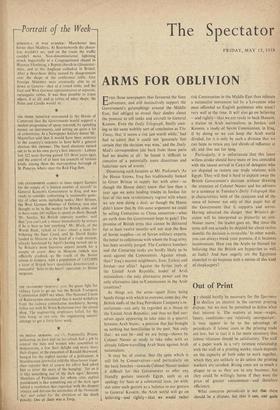Portrait of the Week
SUDDENLY, IT WAS SUMMER: Manchester was hotter than Madeira. At Bournemouth the choco- late wouldn't set, and on the roads the traffic couldn't move. Non-denominational lightning struck impartially at a Congregational chapel in Blaenau Ffestiniog, a Baptist church in Gloucester- shire, and at the Anglican cathedral in Bristol. After a three-hour delay caused by disagreement over the shape of the conference table, four Foreign Ministers were eventually able to sit down at Geneva—they at a round table, and the East and West German representatives at separate, rectangular tables. It was then possible to argue where, if at all, and at tables of what shape, the Poles and Czechs would sit.
THE PRIME MINISTER announced in the House of Commons that the Government would support a modest programme of space research, by spending money on instruments, and setting up quite a lot of committees. At a Newspaper Society dinner Mr. Macmillan said that it would have been contrary to the country's interests to have held a general election this summer. The local elections turned out to be to his own party's best interests: Labour lost 322 seats (having gained 325 three years ago), and the control of at least ten councils of various kinds, among them the metropolitan borough of St. Pancras, where once the Red Flag flew.
*
THE GOVERNMENT AGREED to issue export licences for the supply of 'a limited number of aircraft' to General Kassem's Government in Iraq, and was ready to consider authorising 'a reasonable quan- tity of other arms, including tanks.' Herr Strauss,. the West German Minister of Defence, was also thought to be in the market for British arms, and to have some £45 million to spend on them, though Mr. Sandys, his British opposite number, said that 'you can't ask a visitor Immediately, he arrives if he is here to buy anything.' Mr. Black, of the World Bank, talked in Cairo about a loan for widening the Sue? Canal. and Sir David Eccles landed in Moscow at the head of a trade mission, already heartened by April's having turned out to be Britain's most lucrative export month for a couple of years. Also in Moscow (which was officially credited. as the result of the Soviet census in January. with a population of 5.032,000) a team of British heart specialists demonstrated a successful 'hole-in-the-heart' operation to Soviet surgeons.
THE TRANSPORT TRIBUNAL Rave the green light for railway fares to go up, but the British Transport ComMission didn't say when. The National Union of Railwaymen announced that it would withdraw from the railway consultative machinery, having fallen out with Sir B-ian Robertson over the closed shop. The engineering employers foiled, for the time being at any rate, the engineering unions' attempt to get a forty-hour week,
*
ON FRIDAY MORNING out-irk Pcntonville Prison, policemen, on foot and on horseback had a job to control the men and women who assembled to deMonstrate, a few their delight and many more their disgust, at the execution of Ronald Marwood, hanged for the capital murder of a policeman. A Scandinavian journalist told the Manchester Guar- dian reporter that of course his editor had asked him to cover the story of the hanging: 'for us it is like something out of the dark ages.' Seventy Members of Parliament for whom, also, capital punishment is like something out of the dark ages tabled a resolution that regarded 'with the deepest anxiety and distress the anomalies of the Homicide Act' and called for the abolition of the death penalty. One of them was a Tory.


































 Previous page
Previous page